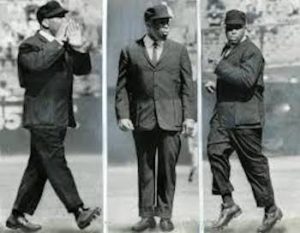
Emmett Ashford
*Emmett Ashford was born on this date in 1914. He was a Black baseball umpire in Major League Baseball's American League.
Emmett Littleton Ashford was born in Los Angeles. CA. His father, Littleton, was a policeman but abandoned the family, leaving Ashford's mother, Adele, to raise Emmett and his brother, Wilbur. Ashford earned money selling Liberty magazine and as a cashier in a supermarket. Ashford attended Jefferson High School, was co-editor of the school paper, played baseball and track, and was the senior class president. Ashford attended Los Angeles Junior College and Chapman University. About 1936, Ashford took a job as a post office clerk, a position he held for 15 years. In the late 1930s, Ashford briefly attempted to play semipro baseball but turned to the umpire when asked to fill in for a referee who did not attend a game.
Ashford served in the Navy during World War II and was inspired to become the first Black major league umpire stationed in Corpus Christi, Texas. An announcement came on the radio that Jackie Robinson had broken baseball's color barrier. In 1951, Ashford took a leave of absence from his Santa Ana, California post office job, where he moonlighted as a Santa Ana municipal league softball and National Night Ball League of Southern California umpire.
His colorful style included a personal trademark: when a batter received a base-on-balls, instead of simply calling "Ball Four," Ashford would grandly intone, "Ball Fo-uh, you may proceed to first base." He left Santa Ana to umpire in the Southwestern International League, becoming the first Black umpire in that traditionally white professional baseball system. When offered a full-season umpiring job, Ashford resigned from the postal service. After the Southwestern International League folded mid-season, Ashford joined the Arizona–Texas League.
He moved on to the Western International League in 1953 and was promoted to the Pacific Coast League (PCL) in 1954. Ashford spent 12 years in the PCL and became known for his exuberance, showmanship, and energy, even interacting with the crowd between innings. During the off-season, Ashford refereed Pac-8 basketball games and college football. He also umpired in the Caribbean winter leagues and ran several umpiring clinics. In 1963, Ashford was named the PCL's umpire-in-chief, making him responsible for training crews and advising the league on disputed games or rules.
By the early 1960s, many West Coast sportswriters suggested that Ashford be promoted to the major leagues. In September 1965, Ashford's contract was sold to the American League. Ashford made his debut at D.C. Stadium on April 11, 1966. He quickly became a sensation, known for sprinting around the infield after foul balls or plays on the bases. Ashford also brought a semi-formal style to being an umpire. He wore jewelry, including flashy cuff links, polished shoes, and freshly pressed suits. While some observers believed his race prevented him from working in the majors earlier than he did, others maintained that his flashy style delayed his major league debut due to general disdain for umpires to draw attention to themselves.
The Sporting News stated, "For the first time in the history of the grand old American game, baseball fans may buy a ticket to watch an umpire perform." Ashford was the left-field umpire in the 1967 All-Star Game and worked all five games of the 1970 World Series but did not work home plate. Ashford reached the American League's retirement age of 55 in December 1969 but still umpired one additional season in 1970 before retiring. In 1971, Ashford was hired by Bowie Kuhn as a public relations adviser, a role in which Ashford spoke and held clinics on the West Coast and as far away as Korea. He also served as umpire-in-chief for the Alaskan Summer League for three years.
He appeared in television commercials, playing a cashier in an ad for A&P Grocery stores. Ashford also appeared as an umpire in the 1976 film The Bingo Long Traveling All-Stars & Motor Kings and episodes of Ironside, The Jacksons, and What's My Line?, in which he appeared in his first major league season. Ashford was also a contestant on You Bet Your Life's November 17, 1955, TV edition. Ashford was inducted into the Baseball Reliquary's Shrine of the Eternals in 2008.
Emmett Ashford died on March 1, 1980, of a heart attack at age 65 in Marina del Rey, California. Bowie Kuhn said, "As the first black umpire in the major leagues, his magnanimous nature was sternly tested, but he was unshaken and uncomplaining, remaining the colorful, lively personality he was all his life." At his funeral, Ashford was eulogized by Kuhn and former USC baseball coach Rod Dedeaux. Ashford, nicknamed Ash, the first Black umpire in Major League Baseball, working in the American League from 1966 to 1970, was cremated, and his ashes were interred in Cooperstown, New York.